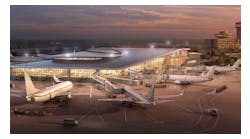Dallas Fort Worth International Airport Recognized for Environmental Dedication with EPA Climate Leadership Award
Dallas Fort Worth International Airport has been selected to receive the U.S. Environmental Protection Agency (EPA) Climate Leadership Award for Organizational Leadership. DFW Airport is now the only airport to be recognized two consecutive years by the EPA in the Climate Leadership Awards program's six-year history.
The Organizational Leadership Award recognizes organizations that not only have their own comprehensive greenhouse gas inventories and aggressive emissions reduction goals, but also exemplify extraordinary leadership in their internal response to climate change, and engagement of their peers, partners, and supply chain.
"Last year, DFW was honored to be the first Airport recipient of the EPA award for Greenhouse Gas Management," said Sean Donohue, CEO, DFW International Airport. "This year's recognition proves we are committed to responding to climate change and implementing the emissions reduction initiatives we've set in place. Our Airport will continue to demonstrate global leadership in sustainability within the industry."
As part of the U.S. EPA's commitment to reducing greenhouse gas emissions, the EPA's Climate Protection Partnerships division co-sponsors the Climate Leadership Awards with two partner organizations — the Center for Climate and Energy Solutions and The Climate Registry. Awardees are honored for exemplary corporate, organizational, and individual leadership in reducing carbon pollution and addressing climate change. The awards take place during the Climate Leadership Conference (CLC), which is dedicated to professionals addressing global climate change through policy, innovation, and business solutions. The conference gathers forward-thinking leaders from business, government, academia, and the non-profit community, to explore energy and climate related solutions, introduce new opportunities, and provide support to leaders taking action on climate change.
DFW Airport plans to continue its reduction initiatives by increasing renewable energy and alternative fuel use; by integrating best available energy-efficient technology into facilities, systems, processes and operations; and, finally, by expanding partnerships with airlines, regulatory agencies, academia, nongovernmental organizations, business associations and other stakeholders to develop effective and sustainable solutions to improve air quality and reduce aviation's impact on climate change.


